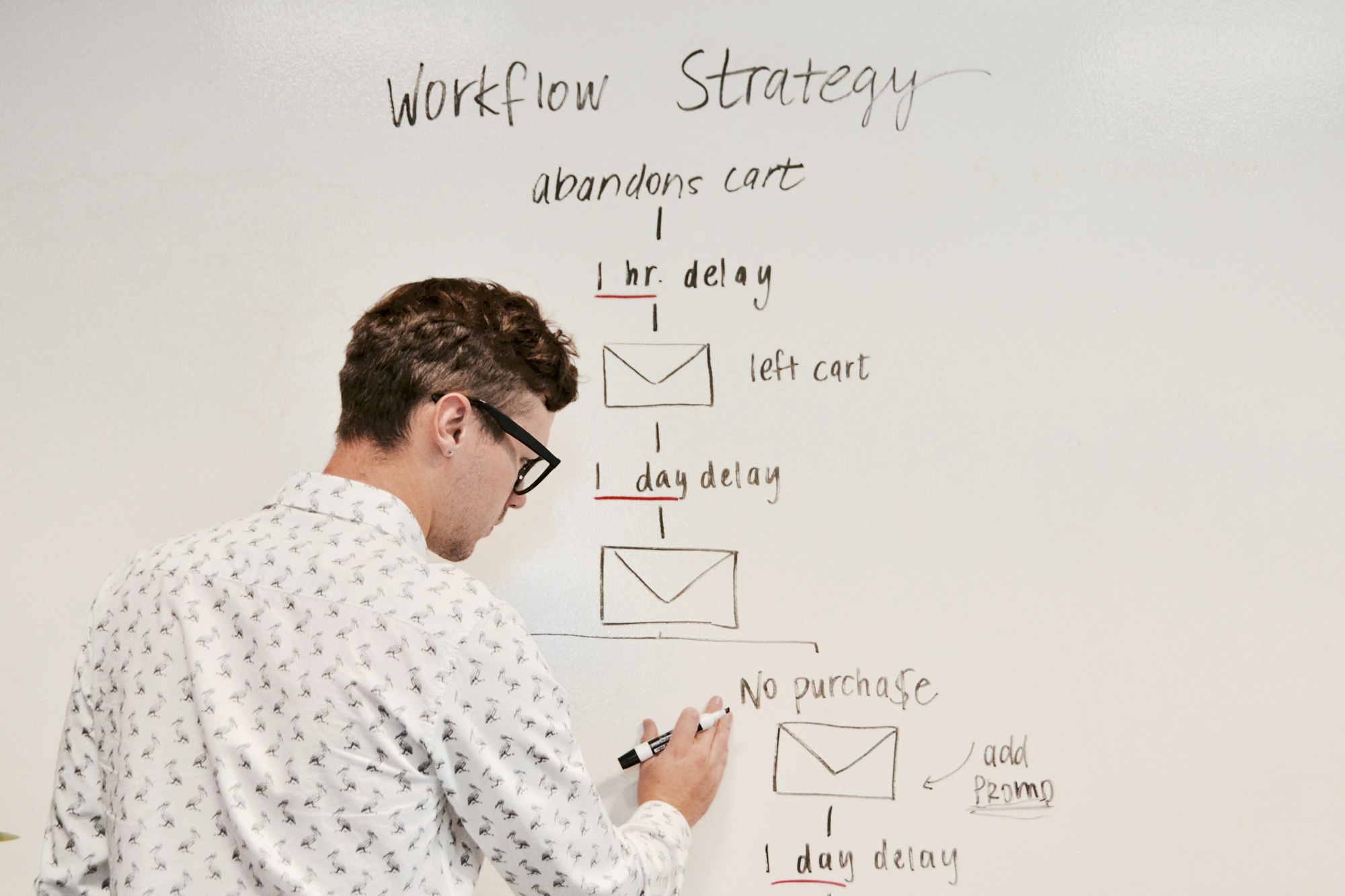Revolutionize Your Life: The Power of Simplification to Overcome Decision Fatigue
Simplifying your life can help reduce decision fatigue and increase productivity. Learn how to minimize possessions, streamline systems, and simplify communication. Reduce the number of decisions to create mental space. Find tips and strategies for embracing simplicity and revolutionizing your life.

We've all been there - that feeling of exhaustion and mental depletion after a day of constantly making decisions - both consciously and unconsciously. Whether deciding what to wear, what to eat, or how to tackle a project at work, the constant stream of choices we face can take a toll on our energy and well-being.
This phenomenon is known as decision fatigue, and it's a real thing. But what if I told you there's a simple solution to reducing decision fatigue and improving your quality of life? The answer is a simplification.
I became sensitive to this issue again after reading "Digital Minimalism: Choosing a Focused Life in a Noisy World" and when I realized how much net work time I gain when I don't receive notifications on my smartphone. When I'm usually mentally tired around 17-18:00ish, I get an extra hour of high-quality, creative, accurate work.
My recognition: even the processing of a tiny piece of information/notification already takes a bite our your mental energy away. And over the course of the day, it adds up!
The Benefits of Simplification
Many of us make life more complicated than it needs to be. We own too many possessions, we create complex systems and processes that are difficult to navigate, and we communicate in ways that are convoluted and hard to understand.
All these factors contribute to the overwhelming feeling of decision fatigue that can plague us. But by simplifying everything we can, we can bulletproof our lives and reduce the amount of fatigue that develops.
Simplifying your life has several benefits. For starters, it means that you have fewer decisions to make daily. This can help to reduce the amount of decision fatigue that builds up, allowing you to approach each day with more energy and focus.

Additionally, You also create more mental space for the things that matter. Think of it like defragmenting a hard drive. By simplifying, you generate more free "blocks" for creativity, problem-solving and focus.
Lastly, streamlining systems and processes can make it easier for others to follow your lead, and communicating clearly and concisely can help avoid misunderstandings and miscommunications.
Ways to Simplify
So how can you start simplifying your life? Here are a few ideas to get you started:
Minimize Your Possessions
Take a look at the things you own and consider getting rid of anything you don't use or need. Not only will this reduce the number of decisions you have to make about what to keep and what to get rid of, but it will also create a more organized and uncluttered environment.
In individual cases, it may seem trivial, but all the small and big possessions will pull you back like chewing gum because you have to take care of them in one way or another.
You could keep it there like Marie Kondo. Look at your possessions and ask yourself if you love them. If you do, keep it. If not, you give it away.
Here are some additional tips for minimizing possessions to simplify your life and reduce decision fatigue:
- Start with a clear-out: Go through your belongings and remove anything you no longer need or use. Be ruthless – if you haven't used it in the past year, chances are you don't need it.
- Follow the one-in, one-out rule: Get rid of something else for every new item you bring into your home. This will help keep your possessions in check and prevent clutter from accumulating.
- Don't be sentimental: It's natural to feel attached to certain items, but try to be practical about what you need. Ask yourself if an item is genuinely bringing value to your life or if it's just taking up space.
- Use storage solutions: Invest in storage solutions like bins, baskets, and boxes to help keep your possessions organized and out of sight.
- Prioritize quality over quantity: Instead of buying cheap, low-quality items, invest in a few high-quality pieces that will last longer and require less maintenance.
- Get rid of duplicates: Do you have multiple copies of the same item? Keep the one you use the most and get rid of the rest.
- Donate or sell items you no longer need: Once you've gone through your possessions and identified things to get rid of, consider donating them to a thrift store or selling them online. This will help you declutter and also do some good for others.

Streamline Your Systems and Processes
Are there ways that you can make your daily routines or work processes more efficient and straightforward? Streamlining these systems can reduce the time and energy spent on them, freeing up more mental capacity for other things.
For example, I used sophisticated productivity systems to track, document and plan many things around my desired transformation. At some point, I measured the time and was surprised that this "overhead" alone consumed 2-3 hours per day. This is an insane waste of time! Since then, I always try to find the most minimal solution. This is a minimalist, cleansed morning routine, choreographed to the minute, and I have exactly one hour to do all my standard daily tasks.
You should apply the same to corporate work. "It's always been that way" is something you will encounter often. For example, I was asked to update a process the other day. I noticed that this process is only used eight times a year. Do you need a process for eight incidents a year? No! Therefore, I did not update the process but abolished it altogether.
Here are seven tips for streamlining your systems and processes:
- Identify and eliminate bottlenecks: Look for areas of your operation that are slowing down and causing delays.
- Automate repetitive tasks: Use technology to automate repetitive or time-consuming tasks.
- Standardize processes: Establish standard operating procedures for tasks that are performed regularly.
- Simplify decision-making: Establish clear guidelines and protocols for decision-making to help streamline the process.
- Use templates: Create templates for standard documents or processes to save time and reduce errors.
- Prioritize your decisions: Identify the most important decisions you need to make and tackle those first.
- Limit the number of choices you have to make: Reduce the number of options you have to consider by simplifying your surroundings and decluttering your environment.
- Use default options: Establish default choices for decisions you frequently make so you don't have to spend time weighing the options each time.

Communicate Clearly and Concisely
Make an effort to be as clear and concise as possible in your communication with others. This can help avoid misunderstandings and miscommunications and make it easier for others to understand and follow your lead.
My wife, for example, likes to write eternally long emails to her boss (a professor), where she goes on long and wide about her derivation and pros and cons, weaves in pleasantries, and then at some hidden point mentions what she wants. She is then somewhat frustrated when only a one-liner returns from the boss.
But that's precisely how it has to be! Just communicate to the point and say what it's about. Simple words. Few filler words. No detours.
Here are seven rules for crisp, clarity-increasing and concise communication:
- Know your audience: Consider your audience's knowledge level, interests, and needs when crafting your message.
- Keep it simple: Use simple language and avoid jargon.
- Be clear and specific: Avoid ambiguity and be as clear and straightforward as possible.
- Stay on topic: Stay focused on the main point of your message and avoid digressing.
- Use short sentences and paragraphs: Long, rambling sentences and paragraphs can be challenging. Keep your sentences and paragraphs short and to the point.
- Use concrete examples: Abstract concepts can be challenging to understand. Use concrete examples to illustrate your points instead.
- Use active voice: Active voice makes your writing more direct and engaging. Avoid passive voice, which can make your writing sound dull and lethargic.
Just ask it something like: "Make this text more crisp, concise and increase clarity: "[INSERT TEXT HERE]".

Examples of Simplification in Action
Here are some examples of well-known individuals who have successfully simplified their lives through minimalism or other approaches to demonstrate the impact simplification can have on one's life:
- Steve Jobs: Steve Jobs was known for his minimalist aesthetic and focus on simplicity. He famously wore the same outfit daily to reduce decision fatigue and was known for his clarity in design, both in his personal life and at Apple.
- Marie Kondo: Marie Kondo is a Japanese organizing consultant and author well-known for her KonMari method of decluttering and simplifying. Her approach involves removing possessions that do not bring joy and keeping those that are essential.
- Leo Babauta: Leo Babauta is a productivity and simplicity blogger and author. He is known for his minimalist approach to life and his focus on simplifying and streamlining processes to increase productivity.
- Bill Gates: Bill Gates is known for his focus on simplicity and belief that technology should be easy to use. He has applied this philosophy to developing products at Microsoft and his personal life.
- Warren Buffett: Warren Buffett is a successful investor known for his simplicity and focus on only investing in companies he understands. He famously lives in a modest home and has a simple, uncluttered lifestyle.
Conclusion
In conclusion, simplification can be a powerful tool for reducing decision fatigue and improving your quality of life. By minimizing possessions, streamlining systems and processes, and simplifying communication, you can create more mental space and reduce the number of decisions you have to make daily.
Additionally, simplification can make it easier for others to follow your lead and help prevent misunderstandings and miscommunications. Embracing simplicity can revolutionize your life and increase productivity and well-being.
So don't wait - start simplifying your life today and see the difference it can make. Your future self will thank you for it.

Feel free to add your tips and thoughts to this page's comment section, Twitter or LinkedIn!
Best regards,
-- Martin from Deliberate-Diligence.com

Discussion